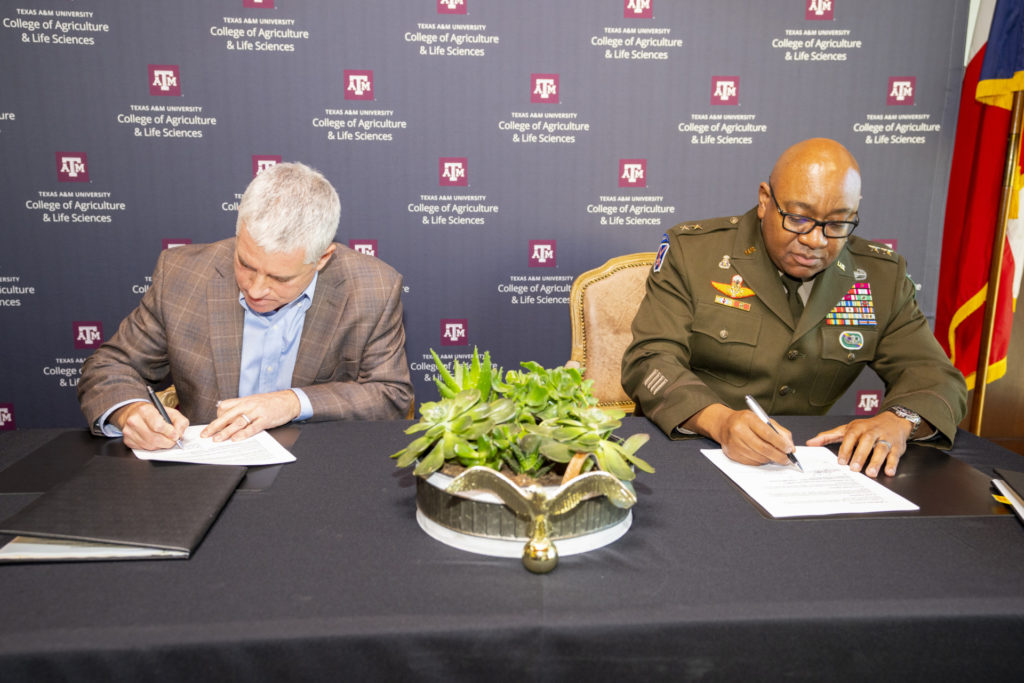Texas A&M and the U.S. Army Civil Affairs partner to reduce conflict through agriculture
Memorandum of Understanding establishes collaboration on long-term ag stabilization, development effort
The Department of Agricultural Economics in the Texas A&M College of Agriculture and Life Sciences and the U.S. Army Civil Affairs and Psychological Operations Command (Airborne), USACAPOC(A), based at Ft. Bragg, North Carolina, have signed a memorandum of understanding to formalize Texas A&M’s long-term support to USACAPOC(A) in the area of agriculture.

USACAPOC(A), part of the Department of Defense, supports the U.S. Army and U.S. Joint Forces Command with trained and ready civil affairs, psychological operations support and information operations capabilities across various military operations.
“In this collaboration, we will seek to improve the effectiveness of development programs and policies for conflict-affected and fragile countries,” said Ed Price, Ph.D., a senior professor in the Department of Agricultural Economics. “This will be accomplished through multidisciplinary research, technical assistance and education.”
The memorandum notes that science and technology can be implemented to reduce armed conflict, sustain families and communities during conflict, and assist in the recovery from conflict.
“This collaboration builds upon two decades of cooperation with the U.S. military civil affairs when Texas A&M University provided agricultural expertise to military commands in Afghanistan and Iraq, both on the ground and through an online agricultural information system,” Price explained. “We hope to establish a teaching and research program that includes archives of USACAPOC(A) records on stabilization and development.”
The case for collaboration
The USACAPOC(A) is required to have agribusiness and food security civil affairs officers to:
— Advise and assist on or reestablish and direct the analysis, assessment, evaluation, planning and implementation of food and agriculture policies and administration.
— Provide technical expertise on systems and processes of resource controls, as well as the implementation of solutions for long-term sustainability, safety and security of the agriculture system.
— Provide technical expertise on the effectiveness and vulnerabilities of the current indigenous production, processing, storage and distribution of food, fiber and wood products.
— Oversee the development and management of resources, agencies, services, personnel and facilities essential to these activities.
Categories of agricultural production include livestock, poultry, grain, vegetables, fruit, fish, fiber and forestry products.
The memorandum states that USACAPOC(A) recognizes the need to partner with organizations and professionals from outside the Department of Defense to maximize the full resources of America’s commercial, academic, not-for-profit and governmental institutions.
“Both Texas A&M and USACAPOC(A) share a strong commitment to supporting agribusiness and food security related to development and post-conflict stabilization,” Price said. “Our mutual goal is to help increase the security and economic stability of various regions throughout the world, and this memorandum outlines how we will collaborate on this goal through agricultural engagement and development.”
Memorandum benefits and collaboration
The collaboration will provide the following benefits:
— Give Texas A&M a formal basis for continued and expanded cooperation through which it can strengthen its research, teaching and technical assistance in the field of conflict and development.
— Provide a rationale for increased support to Texas A&M from private, national and international entities seeking to advance the collaborative mission to support military civil affairs.
— Allow Texas A&M to provide agricultural expertise, services and other resources to support civil affairs programs in the regions and communities of USACAPOC(A) operations.
The collaboration between the two parties will include:
— Texas A&M working with USACAPOC(A) functional specialists on issues relating to agriculture.
— Hosting an annual or biannual “symposium” to develop and study historical case studies relating to civil affairs and agriculture.
— Facilitating networking within USACAPOC(A) and the greater Texas A&M community, including The Texas A&M University System agencies and institutions, former students and other public and private sector partners of Texas A&M.
— Sharing and exploring opportunities for student, staff and faculty exchanges, such as the opportunity to become a USACAPOC(A) civil affairs functional specialist officer, as well as other opportunities for advanced certifications.
— Provide virtual and in-person venues for faculty, students and postdoctoral scholars to share papers and research results that may be of value to U.S. Army personnel around the world who are interested in current and historical agricultural efforts and their impact on security and economic stability.
Online technical resources will be compiled, and as feasible, the records of civil affairs agricultural and community development activities will be acquired, organized and analyzed to build a theory of stabilization and development in fragile regions, improve the training of functional specialist officers and strengthen manuals for field operations.


